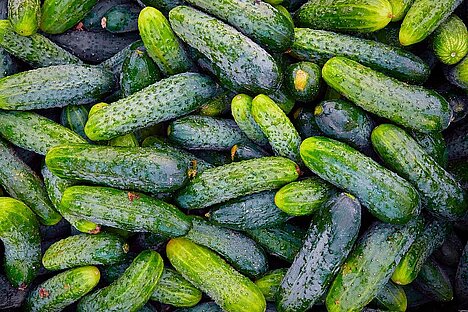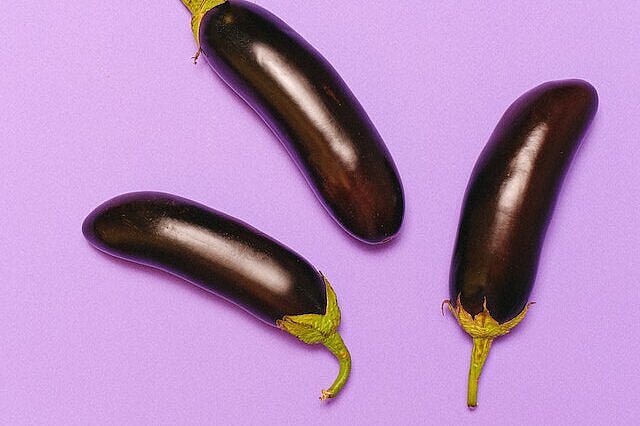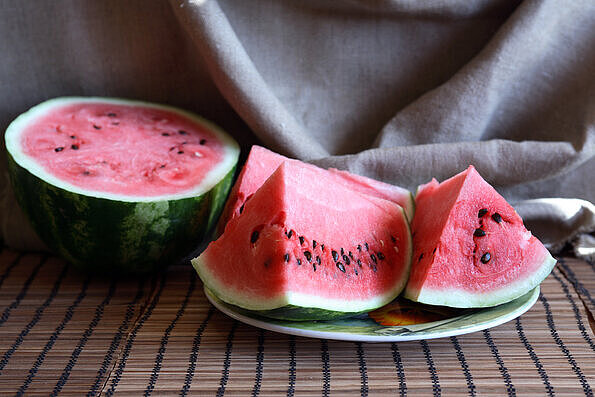Cucumbers

What are cucumbers?
Cucumbers are the fruit of the Cucumis sativus plant, which belongs to the pumpkin family. They have a green skin, which can be smooth or spiky depending on the variety, and a watery flesh with small seeds. Cucumbers are usually eaten raw, but can also be pickled or cooked.
Cucumbers contain a lot of water (approx. 95%) and few calories (approx. 15 kcal per 100 g). They are also rich in vitamins (especially vitamin C and K) and minerals (especially potassium and magnesium). Cucumbers also have a high antioxidant content, which can protect against free radicals.
What are the health benefits of cucumbers for dogs?
Cucumbers, when fed in moderation, can have some health benefits for dogs. For example, they can
- promote fluid intake: Because cucumbers contain a lot of water, they can help dogs meet their fluid requirements. This is especially important on hot days or when your dog is exercising a lot.
- Support digestion: Cucumbers contain fiber, which can stimulate bowel movements and prevent constipation. They can also help to reduce bloating and gas.
- Control weight: Cucumbers are low in calories and fat, but high in volume. This means they can make your dog feel full without overfeeding him. This can be helpful if your dog tends to be overweight or needs to go on a diet.
- Dental care: Cucumbers have a crunchy texture that cleans and massages your dog's teeth as they chew. This can prevent tartar build-up and bad breath.
What are the disadvantages of cucumbers for dogs?
In general, cucumbers are safe for dogs as long as they are not fed too often or in too large quantities. However, there are some potential disadvantages or risks to be aware of. For example, cucumbers can
- trigger allergies: Some dogs can have an allergic reaction to cucumbers or other components of cucurbits. Symptoms can include skin rashes, itching, swelling or breathing difficulties.
- Cause stomach problems: Some dogs do not tolerate cucumbers well or eat them too quickly. This can lead to stomach pain, diarrhea or vomiting. If your dog is sensitive to cucumbers or has eaten too much of them, you should give him plenty of water and reduce or eliminate the cucumber portions.
- Choking hazard: Cucumbers can be a choking hazard for small dogs or puppies if they are not chopped up properly. The seeds can also get stuck in the airways or cause an intestinal blockage. For this reason, cucumbers should only ever be fed in small pieces and care should be taken to ensure that they are chewed well.
Cucumbers are fruits of the plant Cucumis sativus and contain a lot of water, few calories, vitamins C and K as well as minerals. When fed to dogs in moderation, cucumbers can promote hydration, aid digestion, help with weight management and support dental care. However, cucumbers should not be given in large quantities as they can cause allergic reactions, stomach problems or choking.
If you notice any signs of hypersensitivity or poisoning in your dog, you should see your vet immediately. We are not a substitute for a vet, but we try to be as accurate as possible. Every dog reacts differently and we recommend you get a second opinion or consult your vet if in doubt.
Stay healthy and take good care of your four-legged friend!😊
Similar to Cucumbers
The pumpkin belongs to the gourd family (Cucurbitaceae) and originally comes from America. There are over 800 different pumpkin varieties, which differ in shape, color, size and taste. Most pumpkins...
Zucchinis are a form of garden pumpkin that originally comes from Central America. Its name comes from the Italian and means "small pumpkin". Zucchinis have an elongated shape and a green or yellow...
The eggplant belongs to the nightshade family, which also includes potatoes, tomatoes and peppers. It contains solanine, an alkaloid that can be poisonous in high doses. Solanine is mainly found in...
Watermelon is a type of plant from the gourd family that originally comes from Africa. The fruit has a thick, green rind and juicy, red flesh with black or white seeds. Watermelon consists of around...



